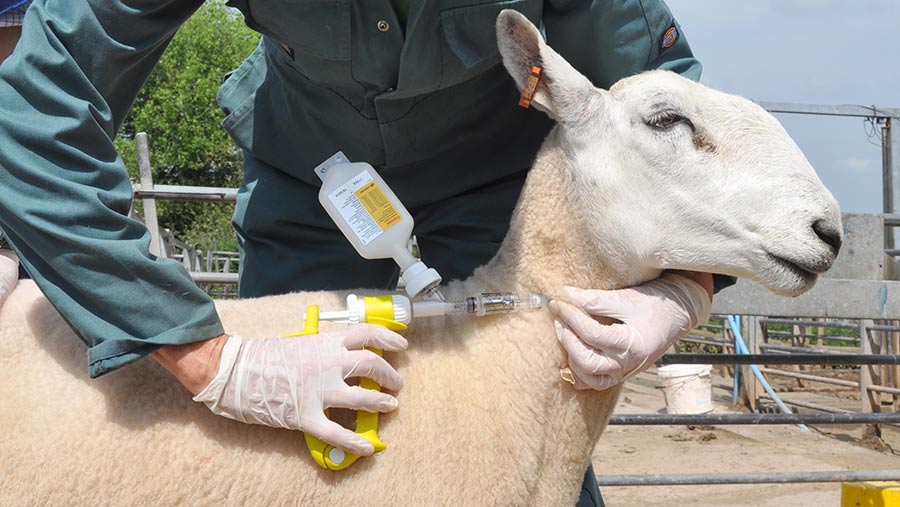There is no one-size-fits-all answer to this question, as the frequency of sheep vaccinations will vary depending on the specific disease being vaccinated against and the area in which the sheep are located. However, it is generally recommended that adult sheep be vaccinated once a year against common diseases such as clostridial infections, while lambs may need to be vaccinated more frequently.
As a sheep owner, it’s important to know how often your animals need to be vaccinated. Vaccinating your sheep on a regular basis is the best way to keep them healthy and free from disease.
There are a few different vaccines that are recommended for sheep.
The most common is the CDT vaccine, which protects against three deadly diseases: chlamydia, diphtheria, and tetanus. This vaccine should be given to all sheep every year.
Another important vaccine is the one for clostridium perfringens type D, which causes enterotoxemia.
This disease is particularly deadly in young lambs, so it’s important to vaccinate ewes before they give birth. Lambs should also be vaccinated at two to four weeks of age and again at eight weeks of age. After that, they should receive booster shots every six months until they’re 18 months old.
So how often do you need to vaccinate your flock? It depends on the vaccines they’re receiving and their ages.
8 in 1 Vaccine for Sheep
As a sheep owner, you are probably well aware of the importance of vaccinating your animals. There are many different types of vaccines available for sheep, and it can be confusing to know which one is right for your flock. The 8 in 1 vaccine is a great option for sheep owners who want to provide their animals with comprehensive protection against common diseases.
This vaccine protects against eight different diseases: clostridiumchauvoei, clostridiumperfringens type C & D, haemophilus somnus, lamb dysentery, pasteurella multicida, septicaemia viridans group and toxoplasma gondii. It is given as an injection under the skin, usually in the neck area. The vaccine provides immunity for up to 12 months.
The 8 in 1 vaccine is considered safe for use in pregnant ewes and lambs over 3 months of age. It is important to note that this vaccine does not protect against footrot or other types of bacteria that can cause disease in sheep. If you are unsure whether this vaccine is right for your flock, speak to your veterinarian for advice.

Credit: www.fwi.co.uk
How Often Do Sheep Need Cdt Shots?
According to the USDA, sheep should be given CDT shots every 6 months. However, some producers give their sheep CDT shots yearly. The frequency of injections may vary based on your region and the recommendation of your veterinarian.
What Vaccinations Do You Give Sheep?
As a sheep owner, it’s important to know which vaccinations to give your flock in order to keep them healthy and disease-free. The most common vaccinations for sheep are for tetanus, clostridial diseases (such as lamb dysentery and footrot), and pneumonia. Other less common but still important vaccinations include those for enterotoxaemia, caseous lymphadenitis, and Johne’s disease.
Tetanus is a serious bacterial infection that can be fatal if not treated promptly. It is often contracted through deep wounds or punctures, so it’s important to make sure your sheep are up-to-date on their tetanus shots. Clostridial diseases are also caused by bacteria and can be deadly if not caught early.
They usually affect the digestive system or the feet, so watch out for signs of diarrhea or lameness in your flock. Pneumonia is another respiratory illness that can be caused by bacteria or viruses; it is particularly dangerous for young lambs or older ewes.
Vaccinations for enterotoxaemia, caseous lymphadenitis, and Johne’s disease are less common but still important, especially in certain regions where these diseases are more prevalent.
Enterotoxaemia is a type of food poisoning that can be deadly; caseous lymphadenitis is a chronic infectious disease that affects the lymph nodes; and Johne’s disease is a degenerative intestinal disorder that primarily affects young animals but can also affect adults. If you’re unsure whether your sheep need any of these vaccines, talk to your veterinarian about what’s best for your flock based on their age, health status, and risk factors.
What is the Standard Vaccine Protocol for Sheep?
There are a variety of vaccines available for sheep and the vaccination protocol will vary depending on the area in which the sheep are located as well as the specific diseases that are prevalent in that area. It is important to work with a veterinarian to develop a vaccination plan that is right for your flock. Some of the most common vaccines used for sheep include those for clostridial diseases, enterotoxemia, tetanus, footrot, and internal parasites.
Do Farmers Vaccinate Sheep?
Yes, farmers do vaccinate sheep. Vaccination is important for protecting sheep from diseases, which can cause serious illness and even death. Farmers work with their veterinarians to determine which vaccines are appropriate for their flock based on the health risks in their area and the specific needs of their sheep.
Vaccinating Sheep. How to Inject the Needle into the Ewe for Beginners.
Conclusion
Vaccinating sheep is important to prevent them from getting sick, but how often do they need to be vaccinated? It depends on the type of vaccine and the health of the sheep. Some vaccines are given yearly, while others are given every few years.
If a sheep is unhealthy, it may need to be vaccinated more often.